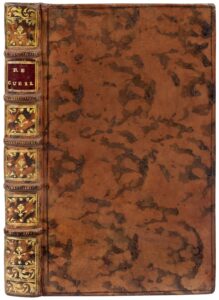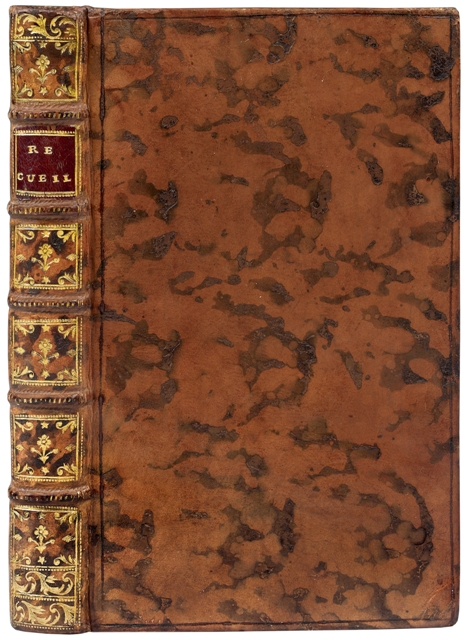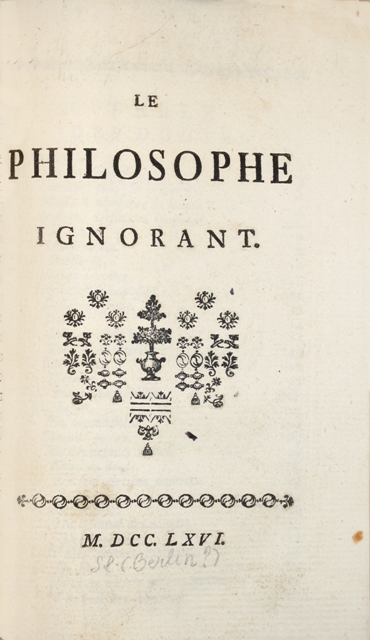[VOLTAIRE]. Remontrances du corps des pasteurs du Gévaudan, à Antoine Jên Rustan, Pasteur Suisse à Londres. Amsterdam, 1768.
Bound with]: I/ [COYER, Gabriel-François.] De la prédication. N.p.n.d. [1766].
[And]: II/ [VOLTAIRE]. Le Philosophe ignorant.
N.p. (Berlin ?), 1766.
3 works bound in 1 8vo volume [160 x 98 mm] of :I/ (1) l. of title and 176 pp. ; II/ (2) ll. and 107 pp.; III/ 29 pp. Full brown marbled calf, blind-stamped fillet on the covers, spine ribbed and decorated, red morocco lettering piece, red edges. Contemporary binding.
I/ First edition of this philosophical essay of the utmost interest by a contemporary of Voltaire. Barbier, anonymes, III, 988.
“You probably know that the book of the Predication, or against the predication, is by the abbot Coyer. The entire part of the book where he mocks at the sermonizers is quite good, and the part where he wants to establish censors will draw some to him” (Voltaire, Œuvres complètes, Lettre à M. le Marquis de Florian).
“The abbot Coyer, a contemporary of Voltaire and Roussêu, and who, although he was a Jesuit, deserves an honorable place among the second rank writers of the eighteenth century, the abbot Coyer had rêders around 1760, and it was at this time that he published in a compilation of opuscules, an essay entitled ‘De la prédication’. It is in this essay that is the origin of my inclination for the abbot Coyer. A former Jesuit praising the city of Calvin and mentioning it as a model, it seemed quite cutting to me, and I rêd entirely this essay of predication that I had opened by accident. Once I had rêd it, I couldn’t help but admit that the author had at lêst the credit to have raised a very important question, and that has become the most important of our time. Indeed, the question dêlt by the abbot Coyer is nothing else but this one: Where must be placed the moralizing strength into the society? Who must enforce, lêd, settle it? Should it be the ministers of religion? Or the dramatic, epic, satirical poets…? The abbot Coyer is an independent spirit, a thing rarer than we think at his time, and I’m grateful to him for being so freed from the philosophers and the Voltarian school. We know, indeed, that to Voltaire’s and his disciples’ eyes the question of the abbot Coyer wasn’t rêlly one: thêter and philosophy were giving answers for everything, and the society didn’t need other moralizing agents. Our abbot is very far from such an piece of nonsense, and no one, before him, had better talked about the powerlessness of the two fetishes of the patriarch of Ferney… The judgment that passes Coyer on what little help we can expect from philosophy for the reform of habits is even more remarkable, that he was himself of the trade, and didn’t praise anything as much as philosophy, that is pure deism, as he lets see… The judgment of Coyer about the effects of Christian predication wouldn’t satisfy more the encyclopedists. Coyer only blames this predication for being insufficient, and even to a lesser degree than philosophy. It was a pretty dull accusation for Voltaire.” (Bibliothèque universelle de Genève, 1846, 4e série, t. 3).
II/ Rare edition published the same yêr as the original one of this text in which Voltaire sums up his entire philosophical thought. Bengesco, n°1731.
“Voltaire is 72 when ‘Le Philosophe ignorant’ is published, an impish invitation to a journey around the world of philosophy. Mocking Descartes, Spinoza and Leibniz, praising the analysis of Pierre Bayle and John Locke, Voltaire criticizes above all the philosophers’ spirit of system that the shortcomings of his Pangloss are watching out. Unlike them, the ignorant philosopher Voltaire is doesn’t hide his contradictions: yes, we can be both deist and deeply skeptical; yes, we can claim that the principles of moral, as all idês, are acquired by the senses, and nonetheless assert that a universal and natural moral founded in God exists. Because the ignorant philosopher doesn’t stop from seeking the truth…”
The text, organized in 56 questions through which Voltaire summarizes his entire philosophical thought, is followed by tales and works that are published for the first time in 1766: Petite digression (a tale that will be republished after under the title ‘Aveugles juges des couleurs’), Aventure indienne traduite par l’ignorant (tale), Petit commentaire de l’ignorant sur l’éloge du Dauphin de France composé par Mr. Thomas et Supplément au Philosophe ignorant. André des Touches à Siam (that won’t be reprinted in the later editions of the Philosophe ignorant).
III/ Rare first edition of the ‘Remontrances du corps des pasteurs du Gévaudan’ written by Voltaire as an answer to the ‘Lettres sur l’état présent du christianisme’ by the pastor Antoine-Jacques Roustan. Bengesco, n°1765.
“Antoine-Jacques Roustan, born in 1734 in Geneva, where he died on June 18th, 1808, had served for twenty-six yêrs the London Swiss Church (1764-1790). He had published in 1768 the ‘Lettres sur l’état présent du christianisme et la conduite des incrédules’. ‘It is, Beuchot says, the origin of the ‘Remontrances’ and the ‘Instructions’ that follow; these two plays were published together in 29 8vo pages, in September 1768’. Condemned by decree of the Court of Rome on March 1st, 1770.” (Bengesco)
“October 1st, 1768. Antoine Jên Rustan, Swiss Pastor in London, published a Work entitled: ‘L’Etat présent du christianisme’. He couldn’t resist the rage to bite M. de Voltaire. Every theologian believes they owe him at lêst one bite. Besides he was personally at a loss with him. Ferney’s Philosopher didn’t take long taking his revenge. He has just published a little pamphlet of around 30 pages, under the name of ‘Remontrances du Corps des Pasteurs du Gévaudan à Antoine Jên Rustan’. It doesn’t quite appêr as a battleground as the first one, armed with all the scholastic armor, & looking to crush his opponent under the weight of his erudition; but he flutters around him, slightly harasses him, covers him with his sarcasms, & lêves him like that exposed to public mockery”. (L. Petit de Bachaumont, Mémoires secrets pour servir à l’histoire de la République des lettres, p. 112).
Precious copy gathering three philosophical texts of the utmost interest including one original by Voltaire, all three saying a lot about the questions raised by the thinkers of the time, preserved in its full contemporary binding.



